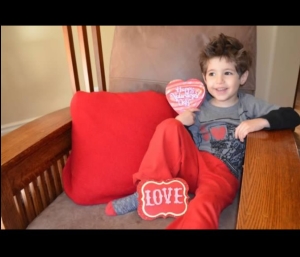“I hate myself. I can’t do it. I’m no good at it. Everyone else can do it and I can’t.”
When I picked my son up from kindergarten many months ago, he uttered those first four sentences. I was driving, so I pulled over to try to understand what he was talking about and find out why he was so upset.
With tears streaming down his face and my heart sinking fast, he told me that the other kids in his class could write words and he could not. I told him we would work on it together and he would be able to write words, too. I took a piece of paper from my glovebox and wrote ‘I Love You’ on it and I brought it to him in the backseat. I went over each word with him. Over and over. And over.
He would get frustrated and I would tell him to take a breath, step back and look again. He stopped crying and hugged me. Finally, he recognized the words. And afterward, he wrote them everywhere…shower doors, scraps of paper, foggy windows, even in ketchup on his burger plate.
We hired a tutor.
Four weeks later, we went in for another conference and were told he was still struggling. My heart began to race with this news. He could copy letters and words, but he was still struggling with comprehending each letter and sound. (This, of course, made it further difficult to write and read.)
They offered us tools to help him. I left the meeting feeling like I had been punched in the gut.
I felt the way my son looked on that day in the car. Incapable. We had failed him somehow. I wondered why he couldn’t hold onto the information. He completely understood numbers but was floundering with letters.
So, I began my now normal parenting routine of FBG, Finger-Blistering-Googling. I discovered many things which led me to the conclusion that he would be able to do it – in time. The growth and maturity of his brain would have a great deal to do with it. His teachers told us this as well.
I couldn’t help but wonder, ‘if this is true, then why must we push him now?’
We hired more help. And, a friend, who is a teacher, kindly offered to help as well. We unabashedly accepted.
I read articles about how our expectations here in the U.S. differ from other countries. One such story, given to me by a close friend, discussed a study in New Zealand where two sets of children started formal literacy, one group at age 5 and the other at age 7. By 11 years old, they found no significant difference in abilities between the two groups. That said, the group that started at 5 had a less positive attitude toward reading. Finland, where formal education starts at 7, is often at the top of the charts (PISA testing) for reading, math and science. The United States struggles in the middle and at times towards the bottom on these charts.
Going into Kindergarten, we were told that all children would be at different reading levels. This is true because of where they went to preschool, and also because of their individual maturity. So, why the rush?
“It’s only KINDERGARTEN!” I kept repeating in my head.
When I was in kindergarten I can only conjure vivid memories of kids eating paste and playing with their private parts…luckily not at the same time, save for one boy, “A.”
I tried to calm myself with reasoning. Our son went to a play-based preschool (a highly praised approach for child-readiness). He is newly six years old. He’s at a new school, doing all kinds of new things. He has a new baby sister; he is a first-born boy. Most importantly, he is STILL GROWING!
I’m not making excuses (am I?), but I feel that we are being asked to give children information at a pace that they may not be mature enough to handle. I worry that this frustrated feeling our son gets with himself will be the foundation for all his years of learning. Because we have great faith in our teachers, we continued to listen and do what we needed to do to be proactive and get ahead of things before they became bigger issues down the road.
Parents are generally hush-hush when it comes to anything that can be looked at as a deficiency in their children. Conversations involving such things are usually done in quiet confidential tones and in secrecy.
 We are proud of our son and have always been of the mind that “it takes a village.” I had no issue discussing our situation with other parents. In doing so, I found it interesting how many were going through the same thing – especially when I prompted the conversations.
We are proud of our son and have always been of the mind that “it takes a village.” I had no issue discussing our situation with other parents. In doing so, I found it interesting how many were going through the same thing – especially when I prompted the conversations.
I learned that several other children in my son’s class, as well as friends at other schools, were also getting extra help.
I felt comforted knowing we weren’t alone. And extremely concerned (and surprised!) that there were so many of us!
Let me say that once I came out and told people what we were going through, it was like I had opened the doors on an avalanche of unknown angst. Last year my friends and I were all stressed about what school would our children be getting into.
Now that we are in those schools we had hoped for, we are stressed out, yet again.
I have had emails, face-to-face conversations and text communications like these: Is your child writing? I need a tutor, who’s yours!, We use XXXX, do you want her number? Is your child reading actual books? and so many more questions!
Parents who work with kids are also experiencing this sense of anxiety with their own kids. How can so many children need tutoring? (I could easily start a support group for “Anxiety-Ridden Kindergarten Parents Who’s Children Need Help Reading Before First Grade.”)
At what point do we need to look at the system instead of the children? And, why is this conversation always held in secret?
I can’t help but wonder if we all need to just take a breath, step back and look at the bigger picture, again?
Beginning of the year update…
Thanks to the help of outside teachers, Our son has improved and is doing much better now. He is often proud of his work in writing and reading. He will grab paper on his own and write things down, proudly showing us his accomplishments. His teachers have since told us he is now absolutely ready for where he now is – first grade. (Sigh of relief)…
Oh, My God…FIRST GRADE?!!

